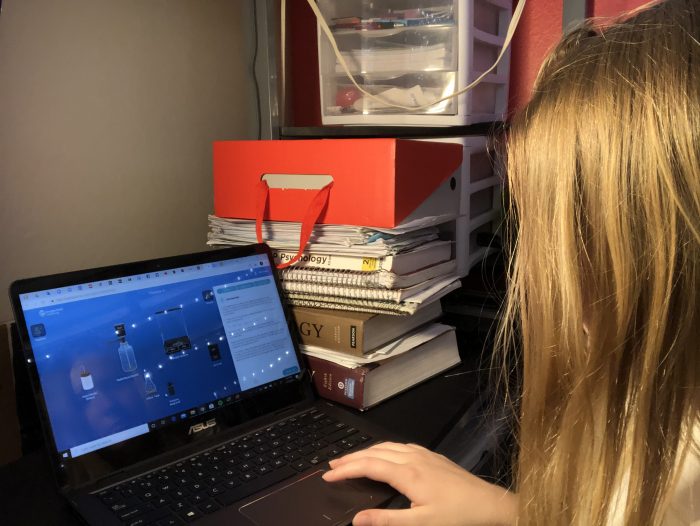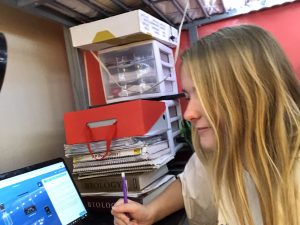
When the email announcing that all classes would be held remotely online starting the following day due to the Coronavirus outbreak, the Piazza became loud with chatter and screams of mixed emotions. Some students were cheering while others were upset and confused. In the following weeks, online learning posed more issues than substituting Zoom for a classroom.
While transitioning to online classes wasn’t ideal, it quickly became reality earlier this year. Effective on March 12, all classes would be moved to an online format. While this is already tough enough on certain students, there are numerous hands-on classes that had to completely reorganize its grading policies and structure.
The transition to online classes came at an especially unfortunate time for senior film production major Leslie Susman. Susman’s film was supposed to shoot over two different weekends, but the remote learning announcement was sent out just days before the second weekend of her film set.
“We only have half a movie right now. It’s really hard to accept… especially because we don’t know how long this quarantine will be and my crew has spent the past year in pre-production,” Susman said.
Susman is still on track to graduate this semester and she is optimistic about her other online Dodge classes.
“I’m still able to get a lot out of my classes, however, I’d say the only negative is lack of engagement and also motivation to do work just because of everything going on,” Susman said.
Chapman’s entire dance department held a meeting a few hours after the announcement was released. During that meeting, senior dance major Catherine Liepins vividly recalls crying alongside other dancers.
“It was such a heartbreaking moment when they told us all of our shows were canceled, after already having put in countless hours of rehearsals,” Liepins said.
Since performances were canceled the dance department waived the performance and choreography credits needed for Liepins to graduate. But after four years of taking dance classes in Chapman’s Partridge Dance Center, Liepins now learns choreography in her living room.
“The main issues that have come up are the technical elements of using a live stream platform. It is super annoying if your computer freezes for a few seconds depending on your wifi connection,” Liepins said.
Sometimes there is a delay when the music plays, causing timing issues while dance students are trying to follow their professor’s moves. Liepins also describes how strange remote learning is for dancers.
“It’s also just really weird to be in a dance class and not feel the energy from the other physical bodies surrounding you,” Liepins said.
But students are not the only ones to feel the effects of online classes.
After following COVID-19 in the news for a few weeks, Dodge College professor Matthew Arkin expected that his classes would be moved online. He had already prepared both of his film classes to understand what remote learning would look like.
“I felt, and continue to feel, concern for my students and their physical and emotional well-being during this crisis, a part of which involves the disappointment of having to complete their IP and visual storytelling exercises under circumstances that are less than ideal,” Arkin said.
After altering his assignments and expectations for his students’ films, Arkin said the transition was fairly smooth. He presents the same film clips and Keynote presentations over Zoom as he would have in the classroom. The only major issue he faced was realizing the films his IP students pitched were no longer possible because of quarantine. But he managed to find a quick solution, to make sure his IP students would still receive credit and learn something from the class.
“Students wrote another script that can be filmed wherever they have relocated and can allow for social distancing, for instance using only members of their own immediate household,” Arkin said.
As freshman health science major Jillian Rogers was adjusting to her chemistry and biology labs, their formats had to completely change to adapt to online learning. Her chemistry lab is done through an online laboratory platform and she no longer has any lab quizzes or lectures from her professor. In fact, her professor has only sent out two emails since the transition to online classes.
“The virtual labs can be a little confusing in the calculations since there is no PowerPoint of help from our professor, besides her office hour,” Rogers said.

While Rogers’ found her other classes transitioned well and she has open communication with her other professors, the workload has been tough.
“The workload is kind of heavy but I think it would resemble the amount of work we would normally have, it is just a lot when I’m at home,” Rogers said.
Students enrolled in science labs are not being refunded.
“Even though we’re not using the labs right now, I don’t doubt the department will use the money for future labs and supplies, so I understand why we are not being given refunds,” Rogers said.
